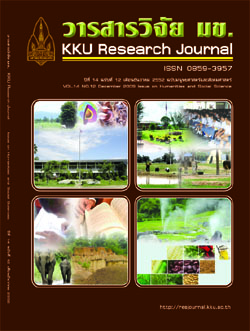Bangkok elementary science teachers' views on zoos as a learning resource for schools
Main Article Content
Abstract
This research study investigated the views on using zoos as a learning resource of 65 upper elementary science teachers in schools under the Bangkok Metropolitan Administration. The study employed an open-ended questionnaire, voluntarily completed by teachers. The data analysis demonstrated that although the teachers believed that using a zoo as a learning resource could be linked to the science curriculum, in doing so most teachers did not emphasize linking the information gathered with science teaching. For evaluation of studentsû learning Outcomes, most teachers focused on student tasks related to the zoo visit. Key factors that affected teachersû use of the zoo as a learning resource included: funds, transportation, teachers, zoos, school administrators, planning, and parents.
Article Details
References
Baimai, V. and Brockelman, W. Y. 1998. BiodiversityResearch and Training Program in Thailand.Pure and Applied Chemistry 70(11):2073-2078.
Chaihongkum, P. 2005. Current Situation andProblems in Teachers Development ofPrimary Schools in Accordance with the6th Educational Development Plan ofBangkok Metropolitan Administration.Master Thesis, Kasetsart University Bangkok.
Coll,†R.†K, Tofield,†S., Vyle,†B., and Bolstad,†R. 2003.Free-Choice Learning at Metropolitan Zoo.Paper Presented at the Annual Meetingof the National Association for Researchin Science Teaching (Philadephia), PA,March 23-26.
Crider, S., Passmore, C. and Anderson, D. 2009.Learning on Zoo Field Trips: The Interactionof Studentsû, Teachersû, and Zoo EducatorsûAgendas and Practices. Science Education94 (1) : 122-141.
Falk, J. H., Moussouri, T. and Coulson1, D. 1998.The Effect of Visitorsû Agendas on MuseumLearning. Curator 41(2): 107-120.
Griffin, J. 2007. Students, Teachers, and Museums:Toward an Intertwined Learning Circle.In Falk, J.H., Dierking, L.D., Foutz,S.(Eds.) 2007. In Principle, In Practice:Museums as Learning Institutions.s(pp.31-42), Lanham, MD: AltaMira Press._____ , and Symington, D. 1997. Moving fromTask-Oriented to Learning-OrientedStrategies on School Excursions toMuseums. Science Education 81(6):763-779.
Henn, M., Weinstein, M., Forard, N. 2006. A ShortIntroduction to Social Research. London:SAGE Publications ltd,
Institute for Promotion of Teaching Science andTechnology (IPST). 2002. The Manual ofScience Learning Management under theBasic Education Curriculum B.E. 2544.Bangkok: Karusapa Press.
Kisiel, J. F. 2005. Understanding Elementary TeacherMotivations for Science Fieldtrips. ScienceEducation 89: 936-955.
Lawson, B. 2007. Understanding Young ChildrenûsAgendas, Experiences, and Learningfrom a Field Trip to a Zoo. UnpublishedMasters of Education Thesis. University ofBritish Columbia, Vancouver, Canada.
Loucks-Horseley, S., Love, N., Stiles, K. E., Mundry,S. and Hewson, P.W. 2003. DesigningProfessional Development for Teachers ofScience and Mathematics. The NationalInstitute for Science Education. California:Corwin Press, Inc.
Melber, L. M. 2001. Why Are They Doing That?Animal Investigations at the Local Zoo.Science Activities 37(4): 10-14.
Moussouri, T. 1997. Family Agendas and FamilyLearning in Hands-on Museums. In Falk,J. H., Moussouri, T., and Coulson1, D. 1998.The Effect of Visitorsû Agendas on MuseumLearning. Curator 41(2): 107-120.
Noymai, I. 2004. Organizing Field Trips for IntegratedLearning. Journal of Education 16(1):1-14.
Office of Natural Resources and Environmental Policyand Planning (ONEP). 2004. çThailandûsBiodiversityé [Online] [Cite 6 January 2008.]Available from : http://www. chm-thai.onep.go.th/Publication/ ThaiBiodiv/ ThailandBiodiversity_eng.pdf.
Office of the National Education Commission (ONEC).2000. Learning Reform: Learner-centeredapproach. Bangkok: ONEC.
Office of the Education Council (OEC). 2005.Research Report about Teaching andLearning with life - Long LearningResources : Zoo. Bangkok : OEC._____ . 2003. National Education Act B.E. 2542(1999) and Amendments (SecondNational Education Act B.E. 2545 (2002)).Bangkok: Pimdeekanpim Co., Ltd.
Orion, N. 1993. A Model for the Development andImplementation of Field Trips as an IntegralPart of the Science Curriculum. School,Sciences and Mathematics 93(6): 325-330.
Pajares, M. F. 1992. Teachersû Beliefs and EducationalResearch: Cleaning up a Messy Construct.Review of Educational Research 62(3):307-332.
Tobin, K., Tippins D. J., and Gallard, A.J., 1994.çResearch on Instructional Strategies forTeaching Scienceé. In Gabel, D.L. (Ed.).Handbook of Research on ScienceTeaching and Learning. New York: Macmillan.
Tunnicliffe, S. D. 1997. School Visits to Zoos andMuseums: A Missed Educational Opportunity?International Journal of Science Education19(9): 1039-1056.


